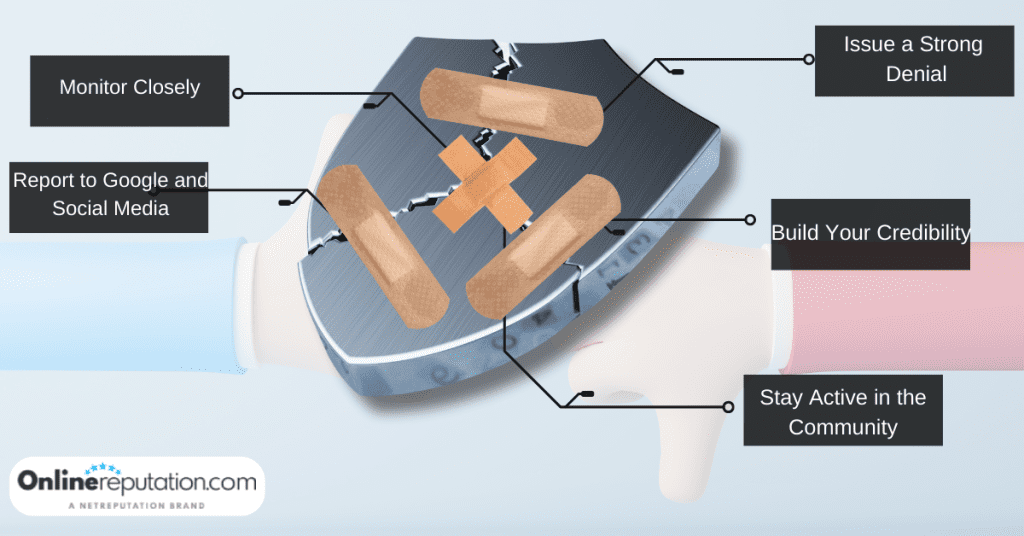
Ever wake up one morning to find your name splashed across some sketchy-looking website accusing you of who knows what? We’ve all seen those tabloid-style “news” sites that peddle outrageous claims and half-truths for clicks. Maybe they’ve targeted a celebrity you follow, or worse, decided to drag your own reputation through the mud. You didn’t do anything wrong, but these fake news vultures don’t care. They’re in it for the attention and ad revenue, not the truth.
The good news is you don’t have to sit back and watch them spread lies about you. Fight back and reclaim your reputation. It’ll take some work, but the truth is on your side. Don’t let fake news websites destroy your reputation. It’s time to set the record straight.
The Rise of Fake News Websites and Their Impact
The rise of fake news websites in recent years has been alarming. These sites publish intentionally false stories for financial gain or political manipulation, and they’re destroying reputations along the way. Once a fake news story spreads, it can be hard to contain the damage.
Fake news sites often target public figures, businesses, and brands. They fabricate scandalous or shocking claims to generate lots of traffic and shares. The subjects of these stories suffer harm to their credibility and prestige. By the time the truth comes out, many people still believe the lies.
Combating fake news requires vigilance and quick action. As soon as a false story surfaces, address it head-on through social media and your website. Issue a statement that clearly labels the story as “fake” or “false” and provides evidence and links to the truth. Report the fake news site to fact-checking organizations that maintain public databases of unreliable websites and news stories.
You should also optimize your own online presence with factual information about yourself or your company. Build a reputation for transparency and integrity so people are less likely to believe lies. Monitor what others say about you on social media and in the press. When you spot more fake claims, repeat the process of publicly refuting them and reporting the sources.
Though the spread of fake news seems unstoppable, individuals and organizations can fight back to limit the damage. By taking swift action and reinforcing the truth, you can overcome falsehoods and protect your reputation. Staying vigilant against the latest dubious claims and unreliable news sources will make you less of a target in the long run. The truth will win out as long as you keep speaking up.
Spotting Fake News Sites – Warning Signs and Red Flags
When you stumble upon a news story online, how do you know if it’s the real deal or just fake news? As much as we’d like to believe everything on the internet, unfortunately, that’s just not the case. Fake news websites are getting trickier to spot, but if you know what to look for, you can avoid being duped.
First, check the website itself. Fake news sites often have URLs that sound like real news organizations but are just slightly off. They may end in “.co” instead of “.com” or have extra words or characters. The website may look hastily put together, with lots of ads and clickbait headlines. Legitimate news sites will have a simple, clean layout and URLs that match their brand name.
Look for credible sources and links to back up claims. Real news stories will cite expert opinions, statistics, studies or reports to support the facts. Fake news stories typically lack these credible sources. They often rely on emotional language and opinions rather than evidence.
Consider if the story sounds too outrageous to be true. While real news can be surprising or upsetting, fake news stories tend to be deliberately shocking or provocative. They play on emotions rather than logic. If something sounds really over the top, it’s probably fake.
The bottom line is using critical thinking. Before believing and sharing a story, look for the warning signs of fake news. Do some searching to verify the facts. The more people demand the truth, the less power fake news websites will have to influence opinions and ruin reputations. Staying vigilant and spreading awareness is how we overcome the threat of fake news.
Case Studies – When Fake News Destroyed Reputations
Fake news websites publish false stories to generate traffic and ad revenue, not caring who they hurt along the way. Unfortunately, their lies can seriously damage people’s reputations and lives. Here are a couple case studies of when fake news reports destroyed reputations:
Dr. Nancy Banks
In 2016, fake news websites falsely reported that Dr. Nancy Banks, an outspoken critic of mandatory vaccination, had retracted her views and admitted “vaccines do not cause autism”. The story spread like wildfire on social media before Dr. Banks even found out about it. By then, pro-vaccine groups had used the fake story to discredit her life’s work. Despite Dr. Banks’ attempts to correct the record, the damage was done. Her reputation as a vaccine expert has been tarnished by this one fake news report.
Pope Francis
In 2018, a fake news story reported that Pope Francis had said “Hell does not exist” in an official Vatican statement. The story was picked up by mainstream media outlets and went viral, shocking Catholics around the world before the Vatican confirmed it was a hoax. Though the Vatican clarified the Pope’s actual views, many still believe the initial false story. This fake news report caused damage not just to the Pope’s reputation but also to the Catholic Church’s credibility.
The spread of fraudulent news reports like these highlights why we must be vigilant in verifying stories from unfamiliar sources and call out fake news whenever we see it. Though reputations and credibility can be hard to rebuild once torn down, taking action against fake news websites and correcting the record as loudly as possible are important first steps. The truth will out, but sometimes it needs our help.
Protecting Yourself – Proactive Steps to Combat Fake News

To protect yourself from fake news attacks, you need to be proactive. Here are some steps you can take:
Monitor Your Online Mentions
Set up Google Alerts for your name and brand so you’re notified whenever new content mentioning you is published online. Check social media regularly as well. The sooner you find fake news stories about you, the faster you can take action against them.
Build Your Online Presence
Having an active and optimized online presence makes it harder for fake news to rank higher than the real you in search results. Start a website or blog, create social media profiles, publish content, get reviews and ratings, and encourage friends/followers to link back to your profiles and site. The more authority and trust signals you have pointing to authentic information about you, the less impact fake news will have.
Correct the Record
If you discover fake news about yourself, take steps to correct the record immediately. Politely contact the publisher and demand a retraction and removal of the content. Be prepared to provide evidence to support your claim. You should also report the story to Google and social media platforms to request its removal from search and newsfeeds. Publish a post addressing the false claims on your own website and profiles as well. The faster you respond, the less time fake news has to spread and do damage.
Consider Legal Action
As a last resort, you may need to pursue legal means for removing fake news, especially if a publisher refuses to cooperate or the story has already gone viral. Consult with a defamation lawyer regarding the merits of a potential defamation or libel lawsuit. While litigation can be expensive, it may be necessary to protect yourself in some situations. Lawsuits can force publishers to remove content and in some cases pay damages.
By monitoring closely, optimizing your online presence, taking swift action to correct false stories, and considering legal options when necessary, you can limit the impact of fake news on your reputation. While you can’t prevent fake news entirely, you can reduce its influence and push authentic information about yourself to the top. Staying vigilant and responding quickly are key.
Recovering From Fake News Attacks – Reputation Repair Strategies

Once fake news attacks your reputation, taking action quickly is critical to limiting the damage. Here are some effective strategies for repairing your reputation:
Issue a Strong Denial
Immediately publish a statement on your website, social media profiles, and anywhere else the fake story appeared to strongly deny the false claims. Provide clear facts and evidence to refute the story in a straightforward, transparent way. Ask followers and readers to help report the fake content to get it removed.
Report to Google and Social Media
Report the fake stories to Google News, Facebook, Twitter, and anywhere else they were published. Ask for the content to be removed due to factually incorrect or intentionally misleading information. The sooner the content is taken down, the less people will see and share it.
Build Your Credibility
Focus on publishing valuable, engaging content on your website and social media to build credibility and push the fake stories lower in search results. Upload photos, videos, blog posts, status updates, tweets, etc. to strengthen your reputation and online presence.
Monitor Closely
Keep a close eye out for new instances of fake stories or similar ones. Fake news websites often create new URLs, accounts, and ways to spread misinformation. Be ready to take quick action against new attacks. Consider hiring a reputation management service to help with ongoing monitoring and removal of fake content.
Stay Active in the Community
Continue to engage with your followers, customers, readers, and community. Reply to comments and messages, even if just to say thanks. Like and share content from others. Make a point to be extra active and responsive. This shows you have nothing to hide and are still the same person or business they know and trust.
With persistence and the right strategies, you can overcome a fake news attack and rebuild your reputation. But the key is to start taking action right away before the false stories spread and do lasting damage. Staying on top of your online reputation and being prepared for these kinds of situations will make you much better equipped to fight back against misinformation.
Ask OnlineReputation.com to help you
If fake news stories about you or your business are damaging your reputation, don’t despair. There are steps you can take to fight back. One effective way is to hire OnlineReputation.com. We have the expertise and experience to help suppress false stories and push them lower in search results.
Submit takedown requests
Our experts can submit official takedown requests to websites hosting fake news articles about you. They know how to properly format these requests to increase the chances of the content being removed. They can also report the articles to Google and Bing, requesting the search engines no longer index them.
Optimize real news
The key is to push real, positive news about you or your company higher in search results than the fake stories. Experts at OnlineReputaions.com use search engine optimization (SEO) techniques like strategic keyword placement, internal linking, and earning high-quality backlinks to rank your official website and social media profiles above the fake ones.
Engage in “search suppression”
Using proven methods, our experts can make it more difficult for people to find defamatory content about you on search engines like Google and Bing. Things like consolidating duplicate content, selecting less important keywords, and earning new backlinks to boost positive content are all part of effective “search suppression” strategies.
Issue counter statements
You may need to publish statements on your website, social media, and press releases with the facts to counter the false claims made against you. Online reputation experts can help craft these statements in a professional, compelling way and make sure they are optimized to appear prominently in search results related to your name or brand. Fighting fake news takes time and persistence, but by employing the services of professionals skilled in online reputation management, you can regain control of how people see you or your company on the internet. With their help, the truth will win out over falsehoods. You can always reach out to us at [email protected] or +1(941)8775953.
You might also like
Online Reputation Recovery After Data Breaches
Ever wake up one morning to find your name splashed across some sketchy-looking website accusing you of who knows what? …
